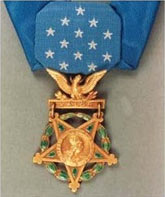Local Hero: Joe P. Martinez
Submitted by Tim Marquart
While I was at UNC, I took a Hispanic Studies class, and our professor was something of an expert on Mr. Martinez. He told us that when Mr. Martinez died, the then largely German Catholic population of Ault denied his family the right for Mr. Martinez to be buried in the Catholic cemetery solely because of his Mexican heritage. Additionally, the Martinez family struggled for a long time trying to get various plaudits for Mr. Martinez that other MoH winners came by easily. One of the more interesting things he mentioned was that the Martinez family was attempting to get DC Comics to publish a war comic featuring Mr. Martinez as the hero, a request that was turned down because DC felt that a Mexican hero would not sell (which, in fairness to DC Comics, was probably true. Modern views and opinions of racism aside, 1940’s America wasn’t the most tolerant environment.) I would hasten to add that I don’t have any particular proof outside of what the professor said, so you can take all that information with a grain of salt.
Credible hard truth, on the other hand, is easy to come by. Fact is, Weld County produced an honest to God America hero in Mr. Martinez. He has had ships streets and a few military buildings named after him. There are three statues of him in Colorado, to include the one in Ault and of course the War Memorial here in Greeley. According to Wikipedia, he was also both the first Hispanic person and the first Coloradoan to be awarded the Medal of Honor in WWII.
To call Mr. Martinez courageous is an understatement. I have been to war, and I can tell you that what he did is nothing short of a miracle. Basically, Mr. Martinez decided to unleash hell while climbing a craggy snow-covered mountain all the while avoiding withering machine gun fire. Tactically speaking none of those things is a good idea, particularly the part where he assaulted an elevated, entrenched position, but this man stood up and did it. Also, he did all this on American soil, not in some distant part of Asia or Europe. He very literally gave up his life defending America. Not just the American ideal, but America itself.
Here is his Medal of Honor Citation, taken form CMOHS.org:
Rank: Private
Organization: U.S. Army
Company: Company K
Division: 32nd Infantry, 7th Infantry Division
Born: Taos, NM
Departed: Yes
Entered Service At: Ault, CO
G.O Number: 71
Date of Issue: 10/27/2043
Accredited to:
Place / Date: On Attu, Aleutians, 26 May 1943

Citation:
For conspicuous gallantry and intrepidity above and beyond the call of duty in action with the enemy. Over a period of several days, repeated efforts to drive the enemy from a key defensive position high in the snow-covered precipitous mountains between East Arm Holtz Bay and Chichagof Harbor had failed. On 26 May 1943, troop dispositions were readjusted and a trial coordinated attack on the position by a reinforced battalion was launched. Initially successful, the attack hesitated. In the face of severe hostile machine gun, rifle and mortar fire, Pvt. Martinez, an automatic rifleman, rose to his feet and resumed his advance. Occasionally he stopped to urge his comrades on. His example inspired others to follow. After a most difficult climb, Pvt. Martinez eliminated resistance from part of the enemy position by BAR fire and hand grenades, thus assisting the advance of other attacking elements. This success only partially completed the action. The main Holz-Chichagof Pass rose about 150 feet higher, flanked by steep rocky ridges and reached by a snow-filled defile. Passage was barred by enemy fire form either flank and from tiers of snow trenches in front. Despite these obstacles, and knowing of their existence, Pvt. Martinez again led the troops on and up, personally silencing several trenches with BAR fire and ultimately reaching the pass itself. Here, just below the knifelike rem of the pass, Pvt. Martinez encountered a final enemy-occupied trench and as he was engaged in firing into it he was mortally wounded. The pass, however, was taken, and its capture was an important preliminary to the end of the organized hostile resistance on the island.